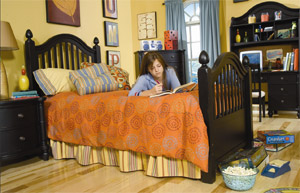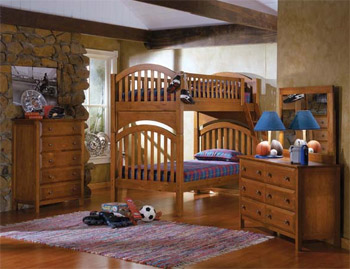Is Your Child Getting a Good Night's Sleep?
 We spend so much time and effort making sure our children are safe, well nourished, clothed appropriately, and generally well taken care of. But how often do we consider the quality of sleep our children get? Sure, we're happy if we can simply get them in bed at their regular bedtime, but are they well rested when they wake up?
We spend so much time and effort making sure our children are safe, well nourished, clothed appropriately, and generally well taken care of. But how often do we consider the quality of sleep our children get? Sure, we're happy if we can simply get them in bed at their regular bedtime, but are they well rested when they wake up?
Sleep quality is extremely important for children's health, and it affects their ability to focus on tasks during the day. Experts say sleep-deprivation - especially among school-aged children - can have severe consequences, including poor concentration, less energy and weakened ability to fight illnesses. According to the National Center on Sleep Disorders Research (NCSDR), children need at least nine hours of sleep each night on a regular basis to be healthy, active, and able to do their best in school, as well as in sports and other extracurricular activities.
Teenagers are no exception. Contrary to the belief that the need for sleep diminishes with age, the NCSDR reported that adolescents actually need more sleep than children just a few years younger, but few adults (or teens) are aware of this. As Dr. Richard Allen, founder of the Johns Hopkins Sleep Disorders Center, points out, "Teens tend to get only six to seven hours of sleep, which isn't enough. They should be getting at least eight to nine hours."
 What can parents do?
What can parents do?
If your child has difficulty waking up in the morning, is irritable and cranky, or has trouble remembering or concentrating, he or she may not be getting enough sleep. The Better Sleep Council offers these top 10 tips to make it easier for parents to ensure their child is getting an adequate amount of sleep each night:
- Help your child get at least 9 hours of sleep each night.
- Don't over-schedule your child. Too many after-school activities and commitments can keep children from precious sleep. Allow your child plenty of time for homework and chores each night to ensure that they are not forced to stay up past their bedtime.
- Set a regular bedtime for your child and stick to it. A regular bedtime can help ensure your child gets a full night's sleep.
- Avoid caffeine too close to bedtime. Consuming caffeine, found in soda and chocolate, in the evening can make it more difficult for your child to fall asleep.
- Develop a sleep ritual for your child. Routine and relaxing activities, like taking a bath or reading with your child, can help him or her transition into sleep mode.
- Help your child unwind in the evening. Tackle science projects, book reports and other homework either before or right after dinner. Allow your child at least one hour before bedtime to relax and unwind.
- Make sure your child's bedroom is dark. Be sure the lights are turned off and the shades are closed in your child's room before he or she goes to bed. While a small nightlight is fine, if necessary, a dark room is most conducive for a good night's sleep.
- Don't allow your child to fall asleep in front of the television. Noise from a television, radio, or even loud conversations can keep your child from deep, restful sleep.
- Pay attention to your child's mattress. Handing down an old mattress to a child isn't a good idea. Because mattresses wear out over time, it's important to maximize your child's chances of restful sleep by making sure he or she is sleeping on a mattress that is comfortable and supportive enough in order to fall asleep, stay asleep, and wake up refreshed.
- Keep a comfortable room temperature in your child's room. Children (and adults) may have a difficult time falling and staying asleep in a room that's too hot or too cold. The ideal sleeping temperature is around 60 to 65 degrees Fahrenheit.
 We spend so much time and effort making sure our children are safe, well nourished, clothed appropriately, and generally well taken care of. But how often do we consider the quality of sleep our children get? Sure, we're happy if we can simply get them in bed at their regular bedtime, but are they well rested when they wake up?
We spend so much time and effort making sure our children are safe, well nourished, clothed appropriately, and generally well taken care of. But how often do we consider the quality of sleep our children get? Sure, we're happy if we can simply get them in bed at their regular bedtime, but are they well rested when they wake up?
 What can parents do?
What can parents do?